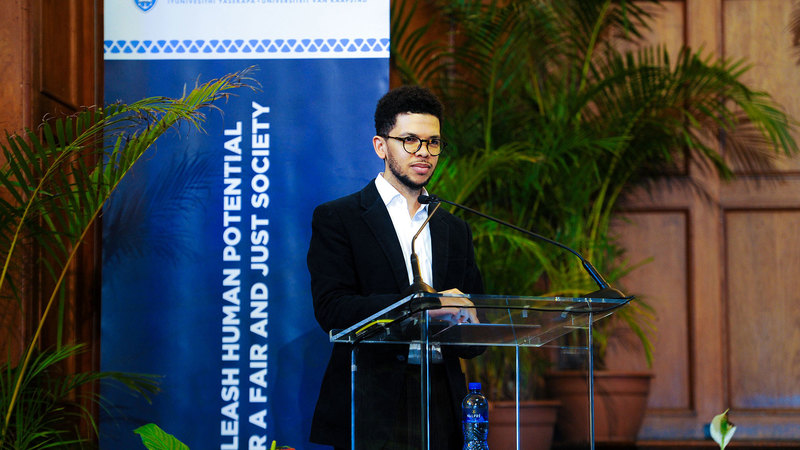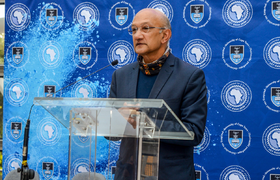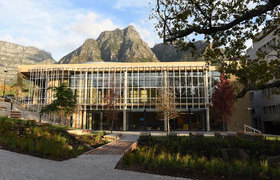Students contribute to reimagining UCT’s future
15 September 2023 | Story Lyndon Julius. Photos Lerato Maduna. Videography and Video Edit Ruairi Abrahams VP Team Ruairi Abrahams, Roxanne Harris, Nico Badenhuizen Read time 6 min.The University of Cape Town’s (UCT) Students’ Representative Council (SRC) and the University of the Future (UoF) Steering Committee hosted a co-create challenge event on Friday, 8 September in the Sarah Baartman Hall. This served as an opportunity for stakeholders to share their vision for and insights of the university. Former UCT SRC chairperson and award-winning author Dr Sizwe Mpofu-Walsh was the keynote speaker.
Programme director, Tebogo Mabusela, welcomed and congratulated the attendees for taking a step toward ensuring the future of UCT is one where students’ voices are heard and accounted for. Mabusela is the chairperson of the Association of Black Securities and Investment Professionals, UCT’s student chapter.
First to address the event was the treasurer general of the UCT SRC, Bhongolethu Tembe, who emphasised the power of collaboration and unity in shaping UCT’s future. He posed thought-provoking questions about student debt and financial sustainability, suggesting that a proactive approach through alumni donations could be a key solution.
“As a treasurer, one of the first questions I ask is: How does the UoF deal with student debt while maintaining financial sustainability? One of the many answers that came to my mind was simply through alumni donations,” Tembe said.
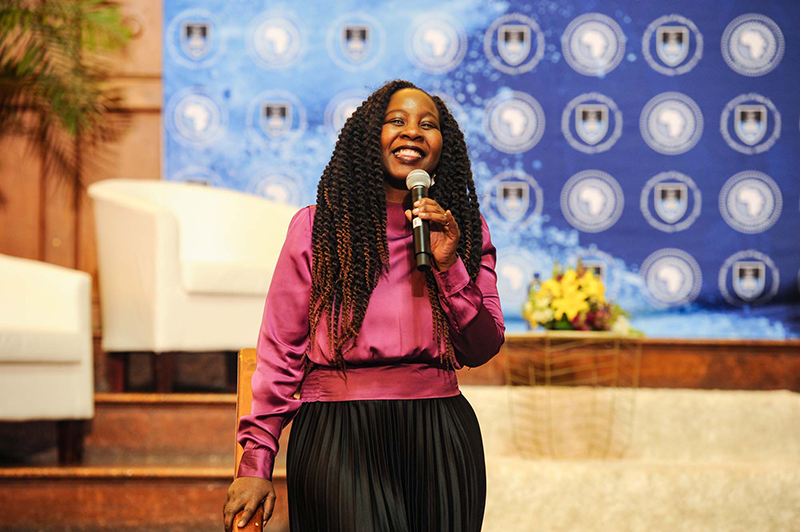
“Just imagine the power of the individual in a collective. So, a simple example I can give is [to] imagine all [students] here were to leave the UCT space, and once we are now in a financially sound position as individuals, we just committed to donate R1 000 … to our institution [every month]. Now what could that do to students’ debt after just one year?” he continued.
Next, Professor Salome Maswime, the head of the UoF steering committee, presented the pivotal points that will guide the UoF’s impact and what can be expected. She emphasised the need for continuous improvement, even in a university as renowned as UCT.
“Our vision for the UoF is creating an enabling environment to unleash human potential for a fair and just society. There is a demand and [pressing] need to increase access to higher education. Education should be a human right.”
She added: “The UoF campus needs to be a smart space and place, inclusive for all. We need to think about how people get through the campus; the mobility of the spaces and places.”
Reimagining UCT together
Dr Mpofu-Walsh elaborated on the power of the African continent and the importance of the UoF in an African context. The former UCT SRC chairperson congratulated the UoF steering committee and the SRC leadership for hosting the co-create challenge event.
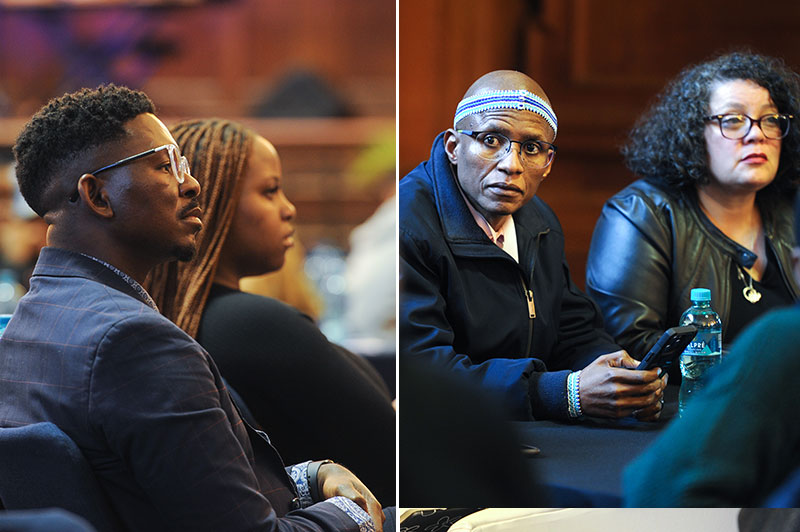
“Thanks for the invitation to collectively rebuild, reimagine, and rediscover our university,” he said as he got his keynote address under way.
He reflected on the initiative’s significance, drawing parallels with the ancient city of Carthage, which was known for its legacy of learning.
“In the third century BC, there was a glistening African City on the northern tip of our continent, which was renowned for its powers in maritime efficiency, in the strategy of war-making, in its capacity for trade, but most importantly, it was known down the centuries as one of the world’s great seats of ancient learning: Carthage,” he said.
“There is no way Carthage can be rebuilt if we are still trying to figure out how to open the doors of this university to those who are good enough to be here but don’t have access to the resources needed. Surely the university of the future in 2034 when you are invited back to speak will not still be grappling with that perennial challenge.
“We can’t set our sights on being a leader on the continent and a leader in the world if this university is not producing the minds, the ingenuity, and the wisdom to overturn the same problems that keep rearing their heads time and again in our country. The university of the future will be one that produces the minds that can get us out of this malaise.”
He continued: “Should we rebuild Carthage, what would that mean as we consider a new era for this crucial institution on our continent and in our world?”
The award-winning author drew a correlation between the success of ancient Carthage and how that civilisation overcame much adversity to rise and become a prosperous nation. He outlined the need for change to happen and that it needs to come from places and spaces that the UoF project is enabled to produce.
“A university of the future will be able to find a way to surmount that central social problem and the minds of that university will find the paths, the roots, the strategies, the policies, the legislative framework, economic policies, the technologies, the engineering designs, the code, and the technological philosophy that will overturn that [which] no generation before has been able to overturn.”
 This work is licensed under a Creative Commons Attribution-NoDerivatives 4.0 International License.
This work is licensed under a Creative Commons Attribution-NoDerivatives 4.0 International License.
Please view the republishing articles page for more information.


